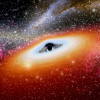Does the cycle of the moon affect your sleep patterns? We find out!
In this episode

00:00 - Does the moon cycle affect human physiology?
Does the moon cycle affect human physiology?
Hannah - To answer Martin's sleepless question, we turn to clock doc, John O'Neil from the Laboratory of Molecular Biology in Cambridge where he works on circadian rhythms. But what exactly are circadian rhythms and how is it relevant to Martin?
John - Your circadian rhythm is the approximately 24-hour biological clock that ticks away in every cell of your body, priming us for wakefulness in the morning and making us feel sleepy at night.
Hannah - Aha! So, could the moon cycle or atmospheric pressure changes affect our circadian rhythms in some way and disturb sleep. Let's start with atmospheric pressure. What's the data on that?
John - I'm afraid there is very little that's known about the effects of high atmospheric pressure on human sleep.
Hannah - That's disappointing. Okay, well what about the moon? Is there any data linking the lunar cycle to Martin's reports of disturbed sleep and wild dreams?
约翰-当谈到月亮,你好storical folklore, the moon very much continues to influence modern day human cultures. But despite a persistent belief that our mental health and other behaviours are modulated by the phases of the moon, until very recently, there has been no solid evidence that human biology is in any way regulated by the lunar cycle. It has been speculated however, that just like with the circadian clock which synchronises to the cycle of day and night, there may exist in humans a lunar rhythm that synchronises with the phases of the moon, as has been observed in certain marine organisms. So, just last month, Anna Wirz-Justice and colleagues performed a retrospective analysis of human sleep data, collected under stringently controlled laboratory conditions with neither the participants nor the investigators being aware of the lunar phase. They found that during the full moon, on average, participants experienced a 30% decrease in deep sleep, otherwise known as NREM sleep, a 20-minute reduction in total sleep, and that it took 5 minutes longer to fall asleep even though they didn't know it was the full moon. This implies that lunar rhythms do exist in humans and it would seem reasonable to expect that some individuals such as your listener perhaps are more sensitive to them.
- PreviousExploring the Solar System
- NextPeachy Pottery









Comments
Add a comment